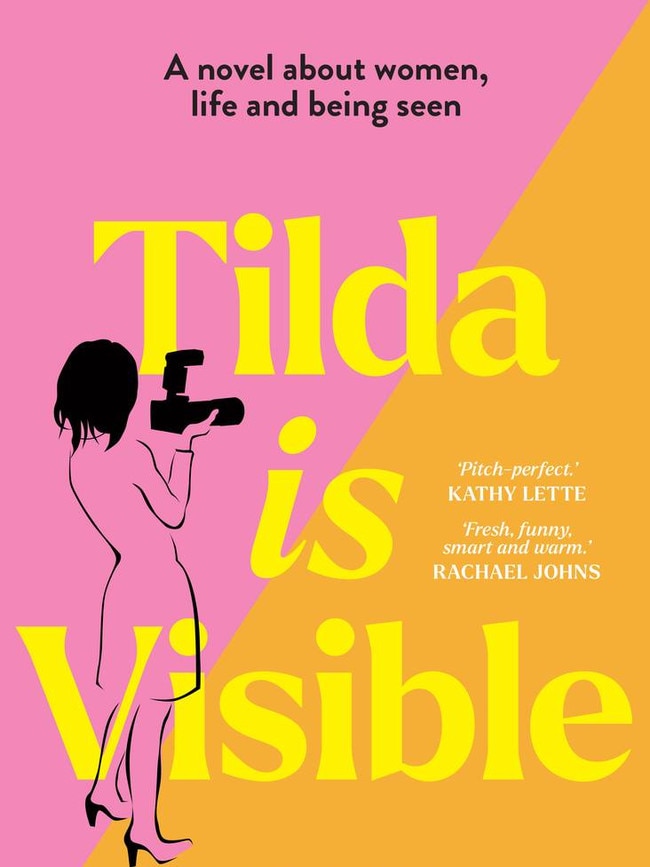Middle-aged women who won’t disappear
Jane Tara has made a career out of promoting books. Now she’s written her own, and it’s a cracker.

Invisibility has an impressive history of showing up in books. Take Griffin, from HG Wells’ The Invisible Man, who disappears as the result of scientific experiments and is beaten to death. Or Tolkien’s loveable Bilbo Baggins who uses the ring of power for a disappearing stunt only to become beholden to its magical pull. Then there’s Harry Potter’s cloak, which led him into all sorts of strife.

Readers willingly suspend reality in pursuit of a good story – and so many heroes’ journeys have been helped along by not being seen.
What about a 50-something woman in a beachside Aussie suburb whose body parts simply start to disappear? First a finger, then an ear, before long she may become just a walking head. Is any reader likely to buy into such an idea?
Well, let me tell you, yes, yes, she is. This very unique scenario is at the centre of author, Jane Tara’s, debut novel, Tilda Is Visible, and within the first few pages, I’m all in.
Tilda Finch has a good life and a successful business selling inspirational quotes on merchandise. She’s divorced, with adult twin daughters, two best friends Ali and Leith and a no-nonsense attitude that means she’d rather make lists than talk about her feelings. She started the business, This Is A Sign, with Leith after their children were born and it’s going gangbusters. We meet Tilda just as one of her fingers disappears and she must face a diagnosis of the uncommon, but accepted, medical condition of invisibility.
At the age of 52, Tilda’s not overly surprised – she’s felt invisible for years. If, like me, you’re sighing and whispering, “haven’t we all”, then this book is for you. It’s unapologetically aimed at older women.
Author Tara says her own experience of entering her forties was crushing; the feeling of not being seen and the accompanying self-judgment on a constantly negative loop. In the book this inner critic is called PEARL (Program Everything and Always Repeat Loop), and Tilda develops a love-hate relationship with her brutally honest alter-ego. PEARL’s put-downs have a familiar twang and Tilda’s growing realisation that she’s her own worst enemy is full of pathos.
About the same time as Tara started grappling with ageing, she was told she was going blind. For months she struggled with the notion of losing her vision, of not being able to see herself age, let alone the rest of her world. Further tests revealed she’d been misdiagnosed but, by then, the seed had been sown, her perception shifted, and Tara began writing Tilda is Visible.
What makes this book so enjoyable is the obvious fun Tara had with the world she created. There’s the slapstick humour of the Invisibility Advocacy Organisation support group meetings where no one knows if the chairs are occupied, or who is raising a hand to speak. And the very liberal use of one-liners as when Tilda and her support group mates are not being served at the pub and one shouts out “What am I, invisible?”.
Tilda’s business brings out a line of products like the divorce T-shirt printed with: “There’s someone for everyone, except you” and the mug: “You’re only as deep as your most recent inspirational quote.” What this does is hold off the narrative from being drowned by the personal development mantras and the self-help speak. Thankfully, Tara’s self-deprecating humour means Tilda and the mystery of her disappearing body parts stays in focus.
The chapters are short and pacy and this makes for easy reading. One of the central layers of the story is the close-knit friendship between Tilda and Ali and Leith – women supporting women. It’s not subtle but it’s strong and lots of fun to read. Then there’s the hot surfer musician Tilda meets at a cafe who is actually blind, and Tara exploits the irony of this mercilessly as they get to know each other. But she also allows Tilda to be more vulnerable in these pages and her voice softens.
That’s not to say the book doesn’t tackle some darker subject matter. Tilda must revisit childhood trauma to understand the root cause of her illness, and this involves domestic violence and death. The chapters that deal with her relationship with her father are sparingly written and poignant. Tara says writing Tilda Is Visible has reinforced her “desire to inspire women to see themselves through kinder eyes as they age. Visibility starts with how we see ourselves.”
Perfect for one of Tilda’s inspirational T-shirts!
Emma Harcourt is the author of The Brightest Star and The Shanghai Wife.







To join the conversation, please log in. Don't have an account? Register
Join the conversation, you are commenting as Logout